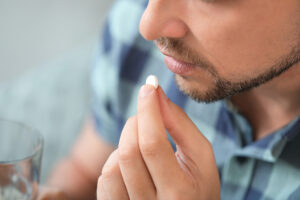Premature Ejaculation
Lots of men are concerned about how long it takes for them to ejaculate. Premature ejaculation (PE) is one of the most commonly reported sexual issues for men. Experts estimate that up to one-third of men experience PE to some degree. Yet many feel embarrassed or ashamed about it.
The good news is that PE is treatable. Many men with PE have success with sex therapy, medications, or a combination of these two strategies.

What is premature ejaculation?
The International Society for Sexual Medicine (ISSM) describes three components of PE:
- The time between penetration and ejaculation is “too short” (according to what the man wishes)
- The man feels that he cannot control when he ejaculates.
- There are feelings of distress.
How short is “too short”? That depends. The desired time frame can be different for every couple. One couple may enjoy five minutes of penetration; another may be completely satisfied with two. As long as both partners are satisfied, there is no “right” time frame.
However, that lack of control—and distress—are important components. Men with PE may feel frustrated and worry about satisfying their partner. Their partners may feel disappointed or worry about their relationship. Single men may shy away from starting new relationships because they’re anxious about ejaculating quickly. Others feel that PE calls their masculinity into question.
Most research on PE focuses on heterosexual and vaginal sex, and the discussion below is based on that research. However, the information may not necessarily apply to gay men, bisexual men, or men who have non-vaginal sex (such as mutual masturbation or oral sex). More research is needed on PE outside of heterosexual vaginal sex contexts.
What’s the official definition of premature ejaculation?
PE is categorized by how long it’s been a problem. The American Urological Association (AUA) explains it in this way:
- Lifelong PE occurs when a man ejaculates within the first two minutes of penetrative sex, has trouble controlling ejaculation, and feels distress. This has been the situation since his first experience with sexual intercourse.
- Acquired PE happens after a man has had some sexual experience. In the past, ejaculatory time frames haven’t been a problem. But now, he ejaculates before he wishes to, has trouble controlling ejaculation, and feels distress.
In some cases, PE happens only with certain partners or in certain situations.
In some cases, PE happens only with certain partners or in certain situations. For example, some sexual problems occur when couples don’t think there’s enough privacy or time for sex.
The ISSM also describes three other situations that are similar to PE:
- Antes portas ejaculation. The term antes portas is Latin for “before the gates.” Men with this condition ejaculate before penetration starts.
- Natural variable PE. Men have early ejaculations from time to time, but not with a consistent pattern. The ISSM calls this “a variant of normal experience.”
- Subjective PE. Men with subjective PE think they ejaculate earlier than other men, but do so in in a time frame of five minutes or more.
What causes premature ejaculation?
Psychological causes
Premature ejaculation often has psychological causes:
Relationship issues. The couple may have conflicts to resolve. Or the man may feel unhappy or insecure in his current relationship.
Depression. Depression can affect sexual relationships in many ways; PE is one of them.
Anxiety and lack of confidence. A man may not feel secure in his ability to please a partner sexually, especially if he has limited sexual experience or a negative body image. This nervousness may lead him to ejaculate before he wishes to.
Feeling guilty about sex. Beliefs that sex is bad or dirty can be deep-rooted and affect performance.
Serotonin
Some researchers think that the neurotransmitter serotonin might be involved with PE. Higher amounts of serotonin have been linked to longer ejaculation times, while lower amounts have been linked to shorter times.
The good news is that PE is treatable
How is premature ejaculation diagnosed?
To diagnose PE, urologists start with a physical exam to make sure the reproductive system is in good working order.
Urologists also ask questions about the man’s medical history, sexual history, and current relationship. Some questions may seem highly personal, but honest answers allow doctors to develop the best treatment plan.
Such questions may include the following:
- How long does it typically take for you to ejaculate?
- How long have you been experiencing PE?
- Does it happen all the time?
- Does it happen with some partners but not others?
- If you have a partner, has this situation affected your relationship?
- If you are single, does the situation prevent you from starting new sexual relationships?
- Do you have any pain or discomfort?
How is premature ejaculation treated?
Once PE has been diagnosed by a healthcare professional, men have a few treatment options they can try. Some involve medications; others involve behavioral therapy. Using a combination of medication and therapy may be even more effective.
Once PE has been diagnosed by a healthcare professional, men have a few treatment options they can try.

Medications
Currently, no drugs have been approved for the treatment of PE in the United States. But doctors sometimes prescribe certain drugs for “off label” purposes. This means that while the drugs haven’t been approved for a specific condition, medical professionals have found them to be helpful for some patients. Options include the following:
Numbing creams and sprays. These products are applied to the tip of the penis about a half hour before sex to reduce sensation. They are then washed off 5 to 10 minutes before sex.
Selective serotonin reuptake inhibitors (SSRIs). These drugs, such as fluoxetine and sertraline, increase the amount of serotonin in the brain. They are antidepressants, but some doctors prescribe them for PE. They are usually taken every day.
Clomipramine. This drug is a tricyclic antidepressant commonly prescribed to treat obsessive compulsive disorder. However, it also works by increasing serotonin levels in the brain. It is usually taken before sex.
Tramadol. An opioid usually prescribed for pain, tramadol can also affect serotonin levels. It needs to be used carefully, as it can be habit-forming.
Alpha blockers (full name: alpha-1 adrenergic receptor antagonists). These drugs are used to treat an enlarged prostate. And while they can delay ejaculation in men with PE, they can affect ejaculation in other ways, too. For example, men taking alpha blockers might have retrograde ejaculation (when semen travels backward into the bladder instead of forward out of the penis) or anejaculation (being unable to ejaculate at all).
Note: Alpha blockers may interact with erectile dysfunction drugs, so men should let their doctors know if they are using either.
Sex Therapy
Working with a sex therapist, alone or with a partner, can have great benefits for men with PE.
Men can review their expectations of sex. Movies and internet videos often show sex lasting a long time, but in reality, time frames vary widely. According to the ISSM, the average time between penetration to orgasm is about five minutes.

Couples can build their communication skills, especially when they’re talking about sex. Single men can also learn strategies for having sexual conversations with new partners.
Men can learn techniques to hold off ejaculation during masturbation or partnered sex:
- The squeeze method:
- This technique helps men recognize the sensations that come before ejaculation.
- It involves stimulating the penis until the man is just about to ejaculate.
- Then, the man or his partner squeezes the penis tip and stops stimulation for about 30 seconds.
- The process is repeated until the man wishes to ejaculate.
- The stop-start method:
- With this method, the man or his partner stimulates his penis until he’s about to ejaculate.
- At that point, they stop the stimulation for about 30 seconds, until the feeling passes.
- Then, the stimulation continues again.
- These steps can be repeated until the man feels ready to ejaculate.
Other strategies for delaying ejaculation
These methods may also be helpful:
- Distraction. Some men try to think of other things—work, a soccer game, the stock market, or some other non-sexual topic—if they are about to climax before they wish to.
- Masturbation before partnered sex. Some men masturbate and ejaculate first and then have sex with a partner. The second orgasm might take more time to reach than the first.
- Wearing a condom. A condom might make the penis less sensitive—not enough to reduce pleasure, but enough to delay ejaculation.
Don’t give up
Premature ejaculation can be frustrating, and treatment might take some trial and error. However, many men find that their ejaculatory control, sexual satisfaction, and confidence improve with patience, time, and treatment.
Resources
American Urological Association
Shindel, Alan W., et al.
“Disorders of Ejaculation: An AUA/SMSNA Guideline (2020)”
(Published in the Journal of Urology: March 1, 2022)
https://www.auanet.org/guidelines-and-quality/guidelines/disorders-of-ejaculation
Cleveland Clinic
“Alpha-blockers”
(Last reviewed: January 18, 2022)
https://my.clevelandclinic.org/health/treatments/22321-alpha-blockers
Harvard Health Publishing / Harvard Medical School
“Which drug for erectile dysfunction?”
(August 9, 2022)
https://www.health.harvard.edu/mens-health/which-drug-for-erectile-dysfunction
International Society for Sexual Medicine
“How can a man effectively delay ejaculation?”
https://www.issm.info/sexual-health-qa/how-can-a-man-effectively-delay-ejaculation
“ISSM Patient Information Sheet on Premature Ejaculation”
(2015)
https://www.issm.info/media/attachments/2021/08/17/03-clinical-guidelines---issm-patient-information-sheet-on-pe---vjan-2015.pdf
Mayo Clinic
“Alpha blockers”
(September 3, 2021)
https://www.mayoclinic.org/diseases-conditions/high-blood-pressure/in-depth/alpha-blockers/art-20044214
MedlinePlus
“Clomipramine”
(Last revised: September 15, 2018)
https://medlineplus.gov/druginfo/meds/a697002.html
“Tramadol”
(Last revised: January 15, 2022)
https://medlineplus.gov/druginfo/meds/a695011.html
Sexual Medicine
McNabney, Sean M., MS, et al.
“Are the Criteria for the Diagnosis of Premature Ejaculation Applicable to Gay Men or Sexual Activities Other than Penile-Vaginal Intercourse?”
(Published: April 24, 2022)
https://academic.oup.com/smoa/article/10/3/1/6825599
Translational Andrology and Urology
Hisasue, Shin-ichi
“The drug treatment of premature ejaculation”
(Full-text. Published: August 1, 2016)
https://tau.amegroups.com/article/view/10984/11770
Urology Care Foundation
“Premature Ejaculation”
(Updated: July 16, 2020)
https://www.urologyhealth.org/urology-a-z/p/premature-ejaculation
